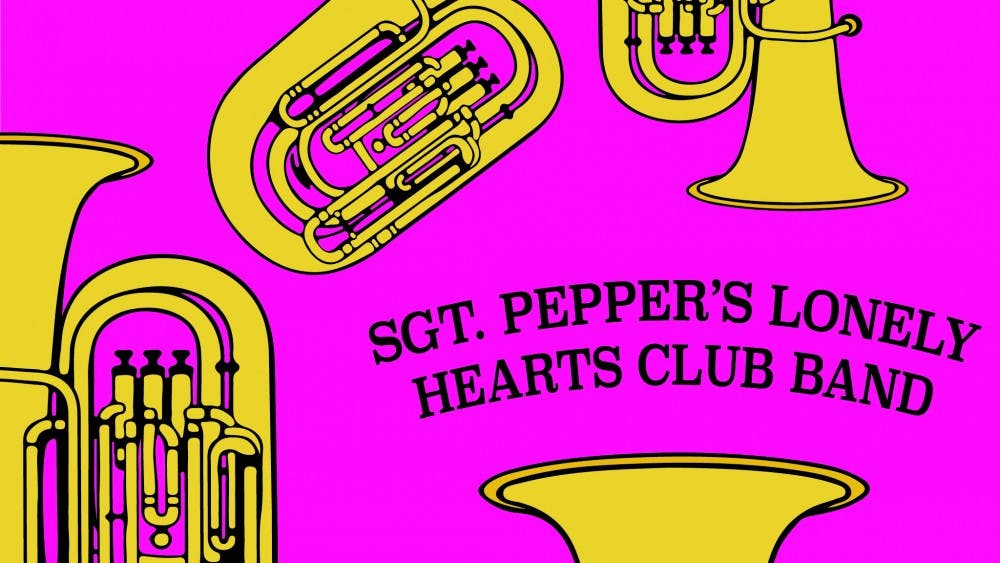On “A Day in the Life,” the epic closing track on The Beatles’ album “Sgt. Pepper’s Lonely Hearts Club Band,” four tracks of a 42-piece orchestra combine for a crescendoing glissando, followed by a dramatic E-major chord from three overdubbed pianos. These are the kinds of effects that epitomize the album — the first since The Beatles stopped touring in 1966 — and the ones that resist live performance.
At Old Cabell Hall Saturday, Tubular — a cover band consisting of two tubists, two euphonists and a percussionist, with occasional cameos from guest musicians — confronted the challenge of performing the album live, juxtaposing the grandness of “Sgt. Pepper” as a record with the smallness of the cover band as a concept.
Like most cover bands, Tubular is a passion project — a way to find a popular audience for a tuba-led ensemble while expanding the canon of tuba chamber music. The inherent tension of a project like Tubular is whether its passion is for an instrument or a genre. The concert offered no clear answer, but its imprecision implied a principal loyalty to the tuba.
Before their first note, the band walked onstage in kitschy military-inspired costumes meant to recall The Beatles’ outfits on the cover of “Sgt. Pepper.” While three Tubular members wore costumes that roughly approximated The Beatles,’ euphonist Michael Brown wore a dark green ensemble in place of John Lennon’s yellow-green, and percussionist Andy Emerich, in a gray uniform, resembled a Confederate officer more than a member of the fictional 1967 band. Still, the costumes made the concert less dignified and more whimsical — probably justified given the casualness of Tubular’s performance.
The instrumentation — which comprised a set of arrangements by tubist Carol Jantsch — effectively approximated The Beatles’ psychedelic sound, but the group inconsistently reproduced original lyrics. Throughout the concert, the American band could not decide whether to mimic the English pronunciations. Lyrical fidelity aside, the most amateurish part of the concert was the strained singing. Lead vocal duties shifted among the band from song to song, but only one band member could passably sing — tubist Scott Devereaux, who at one point conceded the band were “not that amazing of singers.”
The story goes that after John Lennon and Paul McCartney wrote an octave jump into “With a Little Help from My Friends,” Ringo Starr struggled to sing it. Starr eventually hit the note — an E — after coaxing from the rest of the band. In Tubular’s own rendition of the song, Brown conspicuously missed the note, an error tacitly acknowledged by Jantsch when she later admitted writing parts for Brown that are “far outside his vocal range.”
In recent years, the Royal Philharmonic Orchestra has found success recording new instrumental backing to isolated vocal tracks from eminent rock singers. These arrangements succeed because they understand the orchestra’s particular expertise, not because they replace irreplaceable vocalists.
Jantsch and her acolytes could learn the lesson of the Royal Philharmonic by acknowledging their musical limits — outsourcing lead singing to someone more talented or playing instrumental covers. When popular music succeeds, its melodies appeal without words. A project appropriating popular music for classical instrumentation should understand when instruments are enough.
For their encore, Tubular performed an extended medley of Europe’s “The Final Countdown,” Survivor’s “Eye of the Tiger,” Styx’s “Mr. Roboto,” Bon Jovi’s “Livin’ on a Prayer” and Guns N’ Roses’ “Welcome to the Jungle” — all more recent hits than anything on “Sgt. Pepper,” and mostly songs the intergenerational audience at Old Cabell remembered more than The Beatles’ catalogue.
When cultural memory of music fades, what ossifies is the mythology. “Sgt. Pepper’s Lonely Hearts Club Band” was an album of consuming scope, the soundtrack to a palpable 60s summer. That all of its songs are still performed live — by a cover band or otherwise — is an important testament to its influence.







